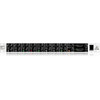Behringer EURORACK PRO RX1602 Manual - Page 10
AUX Channels Modification
 |
View all Behringer EURORACK PRO RX1602 manuals
Add to My Manuals
Save this manual to your list of manuals |
Page 10 highlights
10 EURORACK PRO RX1602 User Manual Balanced ¼" TRS connector strain relief clamp sleeve ring tip sleeve ground/shield ring cold (-ve) tip hot (+ve) For connection of balanced and unbalanced plugs, ring and sleeve have to be bridged at the stereo plug. Fig. 4.2: 1/4" TRS connector ¼" TRS headphones connector strain relief clamp sleeve ring tip sleeve ground/shield ring right signal tip left signal Fig. 4.3: 1/4" TRS connector for headphones operation 5. AUX Channels Modification All monitor and effects signals are tapped into post mute and pre fader, which resembles the function of a pre fader aux channel on conventional mixing consoles. If you prefer to use the aux channels mainly for effect applications, we suggest to alter them to post Fader. The difference is that you extract the respective channels' signal from the effect mix, too, when you turn the LEVEL-control to minimum. You can do this modification for each channel individually, the choice is yours. ◊ The following modifications put your soldering skills to the test. Only attempt to implement them if you feel you have enough past experience. Consider hiring professional help. Regardless of who implements these modifications, they effectively void all warranty claims. ◊ A piece of advice for the brave: bridge endings that are to be soldered should not be put into the drill holes. Instead, bridge endings should be soldered above the drill holes in a flat fashion! A bridge should be somewhat upwardly curved between both of the bases. 1. Power down the unit and unplug the power cord before you remove the cover from the rest of the housing! 2. The positions in question are found on the part of the circuit board located perpendicular to the front side. Please observe figure 5.1. ◊ Hold the unit so that you can read the FX/MON insignia on the circuit board. Soldering points should match those in the illustration. 3. Separate the "pre fader" conductor path. 4. Solder a "post fader" bridge. 5. Repeat this step on as many channels as desired. cut "pre Fader" add "post Fader" link Fig. 5.1: Modification MON/FX "pre fader" > "post fader"0












